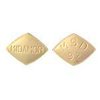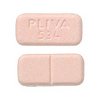INDICATIONS
Lopressor is used for treating high blood pressure, alone or with other medicines; long-term treatment of chest pain; and reducing the risk of death because of heart problems in patients who have had a heart attack. Lopressor is a beta-adrenergic blocking agent (beta-blocker). It works by reducing the amount of work the heart has to do (reduces chest pain) and the amount of blood the heart pumps out (lowers high blood pressure). It is also used to stabilize the heart rhythm in conditions in which the heart is beating too fast or at an irregular rhythm.
INSTRUCTIONS
Use Lopressor as directed by your doctor.
- Do not take in larger or smaller amounts or for longer than recommended. Follow the directions on your prescription label.
- Take Lopressor at the same time every day.
- Lopressor should be taken with food or just after a meal.
- Do not skip doses or stop taking Lopressor without first talking to your doctor. Stopping suddenly may make your condition worse.
- Your blood pressure will need to be checked often. Visit your doctor regularly.
- If you are being treated for high blood pressure, keep using this medication even if you feel well. High blood pressure often has no symptoms. You may need to use blood pressure medication for the rest of your life.
- If you miss a dose of Lopressor, use it as soon as possible. If it is almost time for your next dose, skip the missed dose and go back to your regular dosing schedule. Do not use 2 doses at once.
Ask your health care provider any questions you may have about how to use Lopressor.
STORAGE
Store Lopressor at 77 degrees F (25 degrees C). Brief storage at temperatures between 59 and 86 degrees F (15 and 30 degrees C) is permitted. Store away from heat, moisture, and light. Do not store in the bathroom. Keep Lopressor out of the reach of children and away from pets.
MORE INFO:
Active Ingredient: Metoprolol tartrate.







